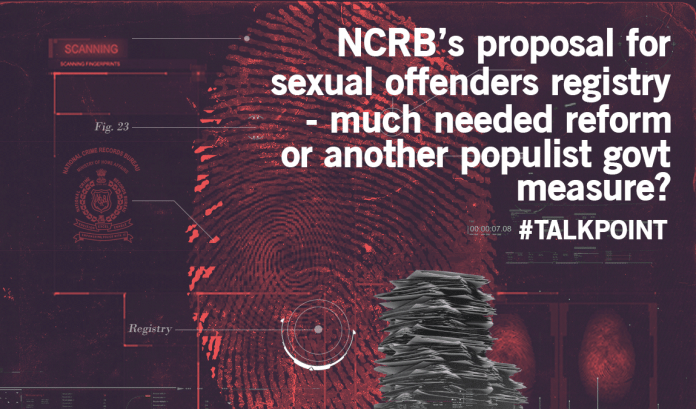The National Crime Records Bureau has invited tenders to develop and implement a National Registry of Sexual Offenders, a database that would track and monitor individuals — both adults and juveniles — convicted of sex crimes. There will be a public registry of convicted sex offenders and a private database of those chargesheeted and arrested for the same.
Critics flag privacy concerns and say that the move doesn’t recognize that most sexual offenders in India are known to the victims.
ThePrint asks: NCRB’s proposal for sexual offenders registry – much needed reform or another populist govt measure?
Sexual offender registry must not exclude those who wield influence and power
 Asha Devi
Asha Devi
Founder, Nirbhaya Jyoti Trust
If the government is introducing a policy to record offenders of sexual crimes and making the information public, then it is a great step. Everyone will know who these people are. The major concern, however, is how effectively can the government implement it?
It is true that a lot of such offences happen within familiar spaces, but we can’t let that deter us. If we really want to put an end to the culture of guilt and shame that keeps women from reporting such crimes, we need to take such steps.
The success of something like this will completely depend on the government’s role in sending the message across to the people about the existence of such a record. Awareness about the registry is crucial, because in the absence of awareness, the registry won’t reach out to those who need it most.
Moreover, we must take care that no innocent person is harassed. The registry must not be misused at any cost. The registry should also include names of all offenders. It should treat all sexual offenders equally and not exclude those who wield influence and power.
Laws have changed, but implementation is always an issue. I cannot say if making criminal records public will stop sexual crimes in society, but the way the government takes things forward will definitely be a start.
We cannot put the rights of an offender before the rights of victims
 Pinky Anand
Pinky Anand
Additional solicitor general of India, Supreme Court
The proposal for a sexual offenders registry is definitely a much-needed reform. Rights of the victim or a probable target need to be balanced vis-à-vis rights of the offender.
The need of the hour is to protect women from sexual offences. We cannot put the rights of an offender before the need to protect women from sexual offences.
The registry will help us create a reliable database and give information to our citizens so that they may be better equipped to protect themselves and their family.
Sex offenders can be anybody, they can be in school, they can be ones who work at your home, they can be relatives or friends, and people who you and your children trust. In this scenario, it becomes extremely important to have the knowledge to protect ourselves and our families.
India is often criticised because the identity of the perpetrator is hidden if sex offences take place in the family. This registry will be a step towards knowing who is a danger and who isn’t.
People should have information about convicted sex offenders
 Rekha Sharma
Rekha Sharma
Member with additional charge of chairperson, National Commission for Women
Despite bringing in the Criminal Law (Amendment) Act, 2013 after the ghastly Nirbhaya incident, sexual crimes against women continue to rise.
After the Kathua rape incident, the central government promulgated an ordinance to award death penalty to child rapists and also asked the National Crimes Records Bureau (NCRB) to maintain a national database and profiles of sexual offenders to strengthen investigation and prosecution and ensure fast-tracking of cases.
The idea is to keep the society aware of the background of people with criminal records. It also works as a preventive step for a person to not commit any offence of a sexual nature as the record of the criminal or the convict will be made public.
It would contain the records of “Arrested and Charge sheeted” and “Convicted” under two clear categories. The information on “Arrested and Chargesheeted” offenders shall be available only to law enforcement agencies, whereas the data for “Convicted” offenders can be accessed by the public. This categorisation is very clear. Information about “Convicted” offenders must be known to the public so that they are more careful and cautious in dealing with such criminals.
Second, this move will indirectly work as a deterrent for the offender who will be careful in future to not repeat his criminal behavior.
National Commission for Women (NCW) welcomes this move by the government and the NCRB. Once the process of preparing this database is complete, it should be put out in the public domain so that people are aware that such a database exists, and from where they can seek required information.
Sexual offenders registry did not work in the US, could flop in India too
 Ranjana Kumari
Ranjana Kumari
Director, CSR
Having a sexual offenders registry is a complex move that must be navigated with great care. Of course, as long as the police are careful and no innocent person gets named in this public registry, it is a great measure. But we have to remember that even politicians are allowed to contest elections until proven guilty.
The registry must only include names of those convicted in sexual assault cases, not those against whom FIRs have been filed. This has to be done to ensure the gravitas of the registry.
The government has hurried through various reforms lately. First, the death penalty was rushed through. Now, they have introduced this sexual offenders registry. It may actually be detrimental to reporting of cases. In most cases of sexual offense, nearly 95 per cent, the crime is committed by someone known to the victim. Will these be reported? It’s highly unlikely.
Even in the United States, such a registry has had little or no impact on reducing crime. It might not act as a deterrent in India either.
Naming and shaming of the offender is a step in the right direction. It shifts the social ostracisation that the victims face to the perpetrator of the crime. We just need to be careful about how it is implemented.
A sex offender database is crucial for preventing daily harassment women face in India
 Saumya Saxena
Saumya Saxena
Legal historian, family law scholar and independent consultant to the Law Commission
Given the frequency of crime against women in this country, maintaining a registry would be a necessary step. Research shows that maintaining police-only registries significantly reduces crimes by repeat offenders. Countries like the United Kingdom, Australia, Canada, New Zealand, among many others, have maintained such registers despite the instances of crime against women being significantly less compared to India.
The modalities of whether this database would be public and who can access it, however, need to be worked out. Such registries should be used by the police to monitor repeat offenders and for prevention of crime rather than public shaming, which has been known to increase recidivism rates.
There is a legitimate concern that such registries may also interfere with rehabilitative justice and in the absence of a strong data protection law, potential breaches are a very real threat. If the names are revealed, it may even feed into religion, caste and class prejudices by profiling of criminals.
However, there are a number of crimes that occur after long periods of stalking and harassment over the phone. Women helpline data from 1090 (Uttar Pradesh) confirms that repeat offenders make unsolicited calls and texts even after arrest and conviction. Therefore, this measure deserves to be seen differently from the gamut of highly populist, knee-jerk reactions we have seen by the government on death penalty and the triple talaq bill. A sex offender database, with robust checks and data protection, is crucial in the light of the everyday harassment faced by women in the country.
Public registries often force former offenders to go back to a life of crime
 Shruthi Ramakrishnan
Shruthi Ramakrishnan
Independent legal researcher, previously worked with centre for child and the law, NLSIU
Post the Kathua rape case, the government has taken a string of populist measures, including the hasty introduction of an ordinance permitting death penalty for those convicted of raping a girl child below 12 years of age.
Now, the government is taking further the call for establishing a sex offender registration programme. Sex offender registries refer to a government-controlled list of convicted sex offenders with regularly updated information regarding their name, residential address, place of work, and physical description. These registries are not a novel suggestion and are functional in about 20 countries.
While sex offender registries, by themselves, cause no harm, laws attached to such registries, such as prohibitory laws and public notification laws, cause great hardship to offenders, and often result in them heading back to a life of crime.
The United States, for instance, permits public notification of the register, resulting in states having a list of former offenders with their details open to public view. In addition, several states impose prohibition on former offenders vis-à-vis employment at certain workplaces; presence near schools, parks, zoos; contacting any children, including their own; and staying in certain residential localities.
This not only reduces their chances of securing decent employment, but also exposes them to harassment and social ostracism. Numerous studies conducted on the effectiveness of the sex offender registries find no impact on the rate of crime, and instead suggest that public notification laws and other prohibitory laws result in increased rate of re-offending among former sexual offenders who now find living a life away from crime not only discouraging but challenging. [JJ Prescott and Rockoff 2010]
While these measures appear attractive and enjoy popular support, it is important to step back and assess the effectiveness of such moves. With poor conviction rate and a large docket of pending cases, these populist measures only focus on the handful of convictions that actually take place in the country, overshadowing the large number of offenders who are acquitted or are never reported.
Government owes women a lot more than just a sexual offenders’ list
 Deeksha Bhardwaj
Deeksha Bhardwaj
Journalist, ThePrint
After December 2012, there were talks about creating a public sex offenders’ registry. Now, five years later, we have Kathua and Unnao as the new triggers.
The national sex offenders’ registry in itself raises many questions. How fair will the registry be unless it charges those in power who often escape the wrath of the law? How fair will it be unless it charges the monsters under our very own beds, in our own homes?
Will this list keep employers from hiring those with a record? Will it percolate the farthest corners of this country, to those sections that have normalised sexual violence?
The registry will be effective only if survivors feel empowered by the police and judicial processes. That is an arduous, often impossible, task considering the many systemic hurdles women face while reporting sexual abuse.
I support the name-and-shame list, only if it promises to end the stigma rape survivors’ face and encourages more women to report such crimes.
However, if this registry becomes a gateway for more crimes against survivors or even convicts, I’m not a fan. If it ends up being limited to a certain spectrum of society, I’m not a fan. If it ends up branding people who may have had scope for reform, I’m not a fan.
The question we need to ask is – what are the consequences of being named on in this registry? The government owes the women of this country a lot more than just a list.
Compiled by Deeksha Bhardwaj and Sankalita Dey, journalists at ThePrint.






